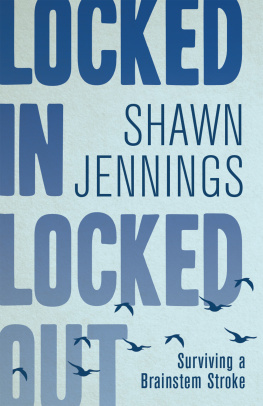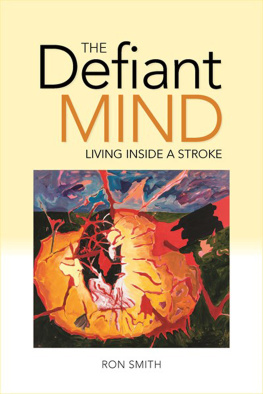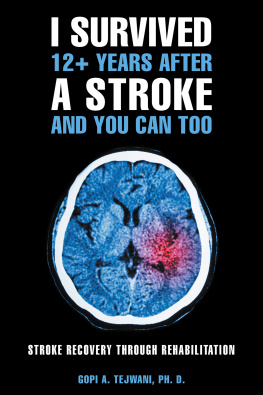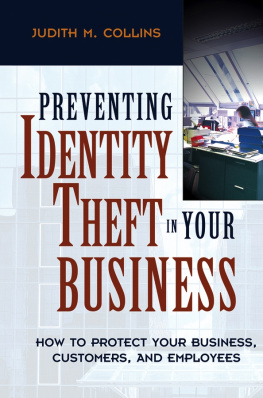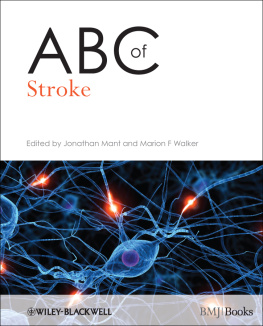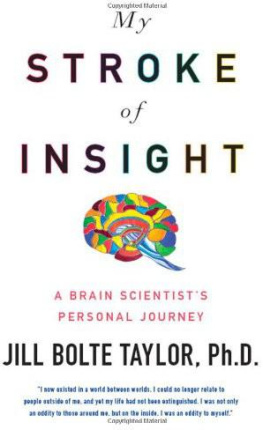Advance Praise for
Identity Theft: Rediscovering Ourselves After Stroke
After watching Debra Meyersons extraordinary academic career cut short by her debilitating stroke, it is so inspiring to see her create such a powerful book for anyone trying to build a life of meaning in the face of adversity.
Claude Steele, Professor Emeritus of Psychology, Stanford University,
and former Dean, Stanford School of Education; author of Whistling Vivaldi
Identity Theft is a scholarly yet easy-to-read exposition that addresses so many issues faced by stroke survivors, especially those with aphasia. It is a story of determination and hope that should be of interest to everyone.
Leora R. Cherney, PhD, Scientific Chair, Think + Speak Lab,
Shirley Ryan AbilityLab; Professor, Physical Medicine & Rehabilitation, Northwestern University
It is a rare book that can begin with medical trauma and loss of self-identity and turn into a deeply moving, surprisingly uplifting, and profoundly wise meditation on what it means to be human.
Rob Reich, Professor of Political Science,
Stanford University; author of Just Giving
With Identity Theft, Debra Meyerson has written what will certainly become a go-to resource for stroke survivors and their families, navigating that critical questionWho do I want to be now?
Julia Fox Garrison, stroke survivor and motivational speaker,
bestselling author of Dont Leave Me This Way
Identity Theft offers a deeply moving, candid, eye-opening, and compassionate picture of life after stroke. It displays the power of resilience, determination, acceptance, and loveand is sure to inspire helpful reflection, no matter ones age or health.
Katherine J. Klein, Edward H. Bowman Professor
of Management and Vice Dean, Wharton Social Impact Initiative,
The Wharton School, University of Pennsylvania
Other Books by Debra E. Meyerson
Tempered Radicals:
How People Use Difference to Inspire Change at Work
(reprinted as: Rocking the Boat: How Tempered Radicals
Effect Change Without Making Trouble)
Preparing Principals for a Changing World
Lessons From Effective School Leadership Programs
Dedication
To Stevemy husband, partner, lover, playmate, best friend, and unnamed coauthor
you are a truly incredible supporter in stroke recovery and life.
Contents
Introduction
" M y name is Debra Meyerson. In 2009, this was a casual self-introduction at the beginning of a lecture at Stanford University. The tone was strong and authoritative, five words opening the door to thousands more over the course of two hours as I confidently led a class through a presentation and discussion about topics like gender, diversity, social change, and identity.
My name is Debra Meyerson. In 2011, this same phrase comes out weak, a faltering melody with an almost nursery-rhyme cadence. The five uneven words are an achievement, the result of a year of speech therapy. A severe stroke in September 2010 robbed me of all speech, and after a year of intensive therapy, my own name still gave me trouble. In times of stress or fatigue, I still fall back on singing the phrase, using a melody to unlock the words.
My name is Debra Meyerson. Who is Debra Meyerson now, in 2018, as I write this book? I am alive, and for that I am lucky and grateful. I live with significant disabilities: no functional use of my right hand, a significant limp, and significantly diminished speech. I can say my own name, and much more, but at times I still struggle to find the simplest of words. This brings me to laughter on my good days and tears of frustration on the bad. I cherish the same values, love the same family, work with the same determination. But I can no longer teach, talk as easily with family and friends, or ride a bike on my own.
My name is Debra Meyerson. Strokes dont just create physical and mental disabilities, they can also steal our identities. Much of my pre-stroke life became inaccessible. Understanding and accepting the loss of my old life was one of the hardest parts of my recovery and rebuilding process. Along with the constant rehab and speech therapy aimed at physical recovery, Ive spent the past eight years working to regain my sense of self, trying to answer the question: who am I now?
As a professor at Stanfords Graduate School of Education and Graduate School of Business for fifteen years, I studied how personal identity shapes peoples experiences in their organizational lives. My understanding of our multiple identities to improve the way organizations handle difference and conflict.
Instead, I find myself grappling to understand my own identity. My stroke took away my capacity to work as I did before, many of my abilities, and many of the other pieces of the life I had built over five decades. Although my physical capabilities were erased nearly overnight, there was no analogous identity switch that signaled how my sense of self had changed. But over time, this change became clear. Activities I loved were out of reach; colleagues, friends, and strangers treated me differently; family dynamics changed dramatically. I even noticed my own attitude changing in certain ways.
I have gradually regained some of the capabilities I initially lost, and the recovery of my identity has been an equally difficult journey, one that took me about three years to even recognize. Following my stroke, I found numerous resources to help me understand my journey to recover physically, but there was a profound lack of guidance when I faced the emotional challenge of rebuilding my sense of self in this new and maddening circumstance. As I talked with other stroke survivors, I found this to be an extremely common frustration.
For many of us, clarifying essential elements of our selves is critical to regaining capability and confidence, whatever physical challenges remain. As we try to restore parts of the identities we had before the stroke, we are also reinventing new onesall the while grasping for tools to help us think about how our lives should be evolving. Do we stay determined not to let the stroke win and keep battling for more recovery? Or do we accept that we need to let go of our past selves? Or both?
I was confused and struggling. But I was still thinking like a social scientist. I tried to make sense of the experiences that I and others in my new community of survivors were going through. Was their sense of self shattered like mine? How did it evolve with time? Did they ever lose hope? How did they balance the time and rigor of rehabilitation with an acceptance of their newfound limitations? How did they maximize life within those constraints? Did they, as I did, eventually discover some silver liningsways in which some things were actually better after stroke, in spite of all the frustrations?
While exploring these questions, I was ushered into a whole community built around poststroke lifea community I never had reason to notice before. I encountered it at therapy centers and speech clinics, through survivor support groups meeting in coffee shops, on Facebook and other online groups. I actually started to notice similar dynamics in other communities, as wellcolleagues struggling with the loss of a partner, survivors recovering from brain injuries, and even just friends facing the realities of older age. The more I thought and talked about it, the more I realized how many of us are united in this journey to understand and shape our own identities in the face of life changes.


